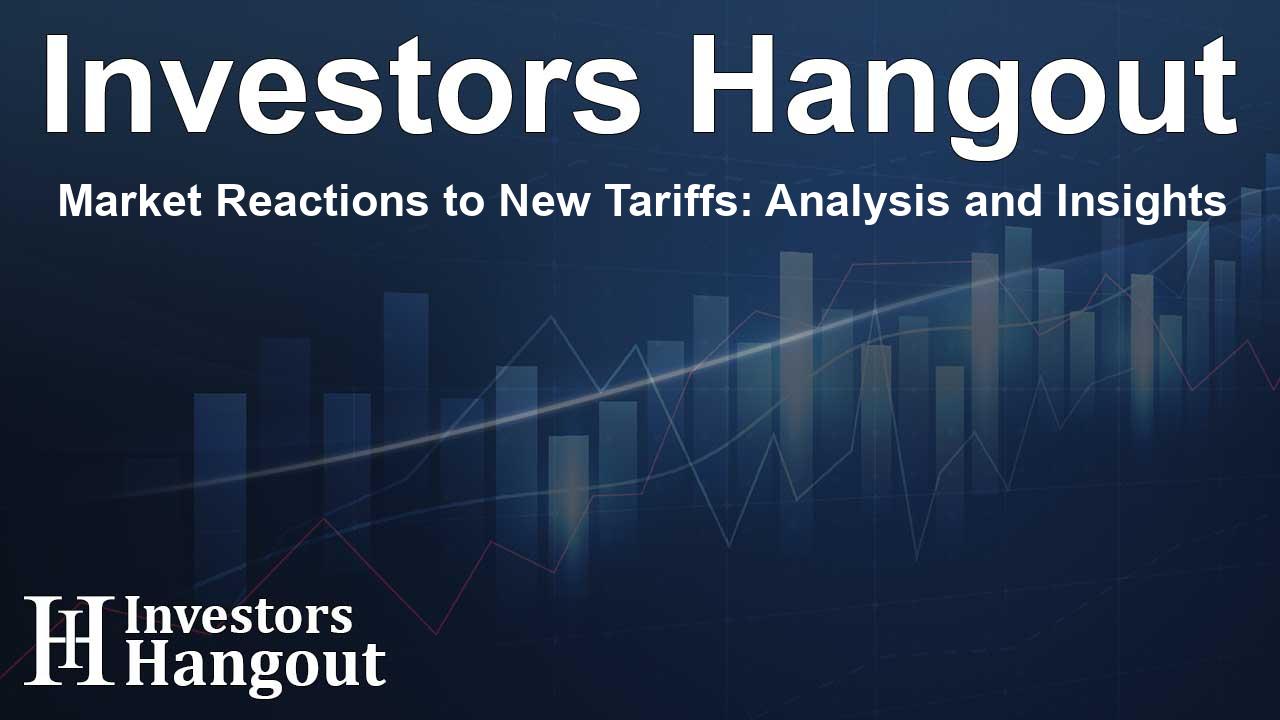Market Reactions to New Tariffs: Analysis and Insights

Market Reactions to New Tariffs
Recent announcements regarding sweeping tariffs have made a significant impact on the financial markets. These developments began with the announcement of a 25% tariff on imports from select countries, which had traders and investors reacting immediately to the news.
Impact on Financial Markets
Following the announcement, the S&P 500 experienced a drop of 0.9%, while the Dow Jones Industrial Average fell by 1.1%, reflecting a loss of approximately 450 points. This swift decline indicates how sensitive the market is to tariff-related news, impacting investor sentiment.
The CBOE Volatility Index (VIX), often referred to as the market's fear gauge, surged by 11%, illustrating an increase in market anxiety. Almost all sectors in the S&P 500 faced declines, with cyclical stocks showing the most vulnerability. Notably, Tesla Inc. (NASDAQ: TSLA) emerged as one of the worst performers, showcasing a decline of 7.4% amid broader market turmoil.
Currency Market Developments
In currency markets, the U.S. dollar saw a significant uptick, climbing 0.6% and marking the strongest performance in nearly three weeks. This surge is attributed to investors flocking to the relative safety of the dollar amid global uncertainties. In comparison, the dollar appreciated over 1% against the Japanese yen and gained 1.2% against the won.
U.S. Treasury yields also saw movement, with the 10-year bond yield increasing by four basis points, now standing at 4.39%. Generally, higher tariffs can spark inflationary fears, which tend to influence bond prices negatively while pushing yields higher.
Sector Performance Insights
As financial analysts sift through the aftermath of these tariffs, precious metals like gold have shown resilience, stabilizing as investors sought safe-haven assets amid escalating trade tensions. Bitcoin (BTC/USD), however, saw a slight dip of 0.7%, settling at $108,000, extending its current streak without breaking its all-time high of $112,000.
Overall Market Index Performances
Here's a look at some major indices and their corresponding performance updates:
- The Nasdaq 100 closed at 22,700.46, down 0.7%.
- The S&P 500 ended at 6,223.21, down 0.9%.
- The Dow Jones Industrial Average registered at 44,321.98, down 1.1%.
- The Russell 2000 slid to 2,212.65, down 1.6%.
Exchange-Traded Funds (ETFs) Performance
The following ETFs also experienced notable fluctuations:
- The Vanguard S&P 500 ETF (NYSE: VOO) decreased by 0.9%, trading at $569.94.
- The SPDR Dow Jones Industrial Average ETF (NYSE: DIA) dropped by 1.1%, settling at $443.18.
- Invesco QQQ Trust Series (NASDAQ: QQQ), which focuses on technology stocks, saw a decrease of 0.8%, priced at $551.92.
- The iShares Russell 2000 ETF (NYSE: IWM) tumbled 1.5%, now at $219.79.
- The Consumer Staples Sector SPDR Fund (NYSE: XLP) slightly outperformed other sectors, down only 0.4%.
- Energy Select Sector SPDR Fund (NYSE: XLE) lagged, decreasing by 1.5%.
Conclusion and Future Outlook
The overall market's response to these new tariffs emphasizes the sensitivity of financial markets to governmental policy shifts. Investors are advised to stay informed about potential changes as negotiations continue and to consider the broader implications these tariffs may have on trade and economic conditions globally.
Frequently Asked Questions
What are the major factors behind the recent market slump?
The market has reacted negatively to the announcement of new tariffs, which has raised concerns about potential inflation and economic growth setbacks.
How has the U.S. dollar performed recently?
The U.S. dollar has strengthened significantly due to investor demand for safety in unstable market conditions, rising by 0.6%.
Which sectors were most impacted by the tariffs?
Cyclical stocks were notably affected, with many sectors showing declines. Technology stocks also faced significant selling pressure.
What is the impact of tariffs on Treasury yields?
Higher tariffs often lead to inflation fears, resulting in increased treasury yields as investors adjust their expectations for economic growth.
How has Bitcoin's value changed amid these events?
Bitcoin has edged down 0.7%, continuing its streak without reaching its previous all-time high of $112,000.
About The Author
Contact Thomas Cooper privately here. Or send an email with ATTN: Thomas Cooper as the subject to contact@investorshangout.com.
About Investors Hangout
Investors Hangout is a leading online stock forum for financial discussion and learning, offering a wide range of free tools and resources. It draws in traders of all levels, who exchange market knowledge, investigate trading tactics, and keep an eye on industry developments in real time. Featuring financial articles, stock message boards, quotes, charts, company profiles, and live news updates. Through cooperative learning and a wealth of informational resources, it helps users from novices creating their first portfolios to experts honing their techniques. Join Investors Hangout today: https://investorshangout.com/
The content of this article is based on factual, publicly available information and does not represent legal, financial, or investment advice. Investors Hangout does not offer financial advice, and the author is not a licensed financial advisor. Consult a qualified advisor before making any financial or investment decisions based on this article. This article should not be considered advice to purchase, sell, or hold any securities or other investments. If any of the material provided here is inaccurate, please contact us for corrections.
